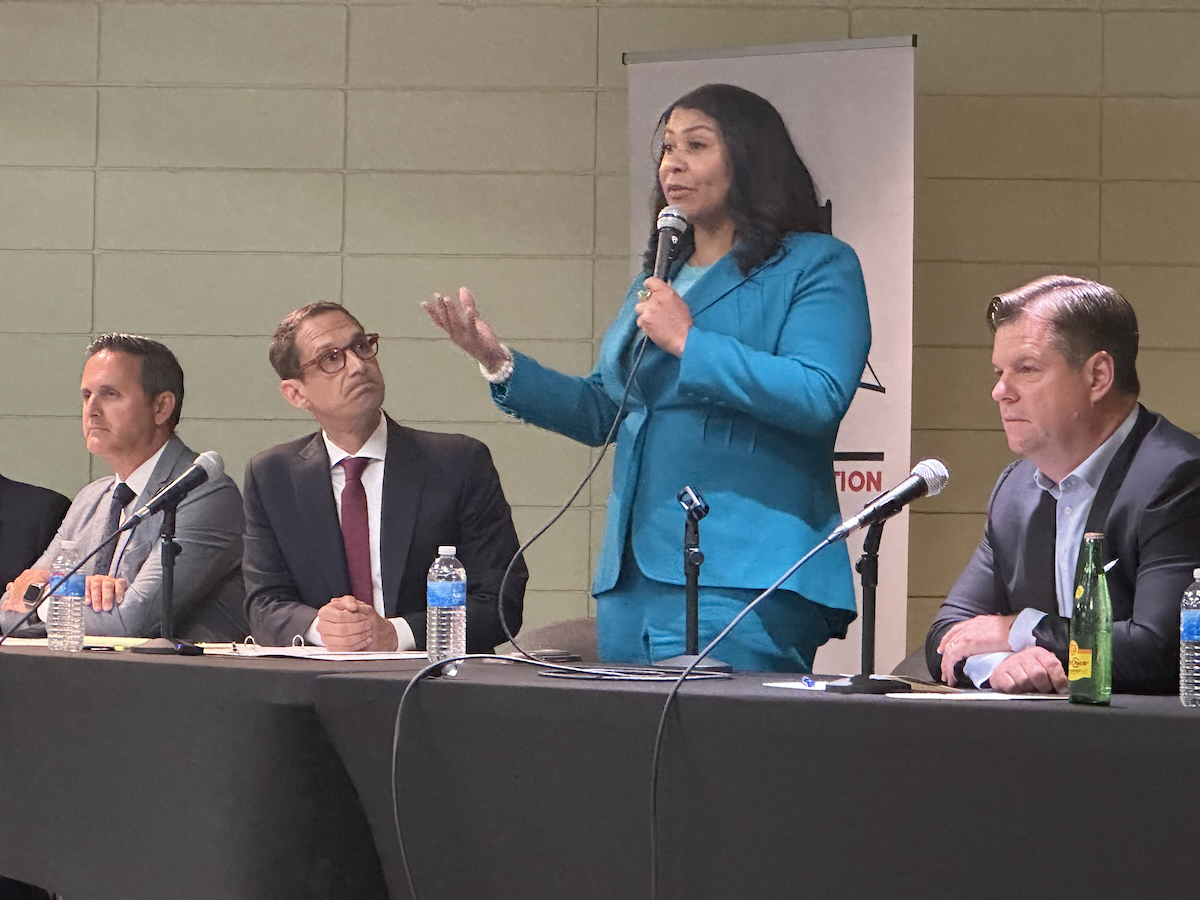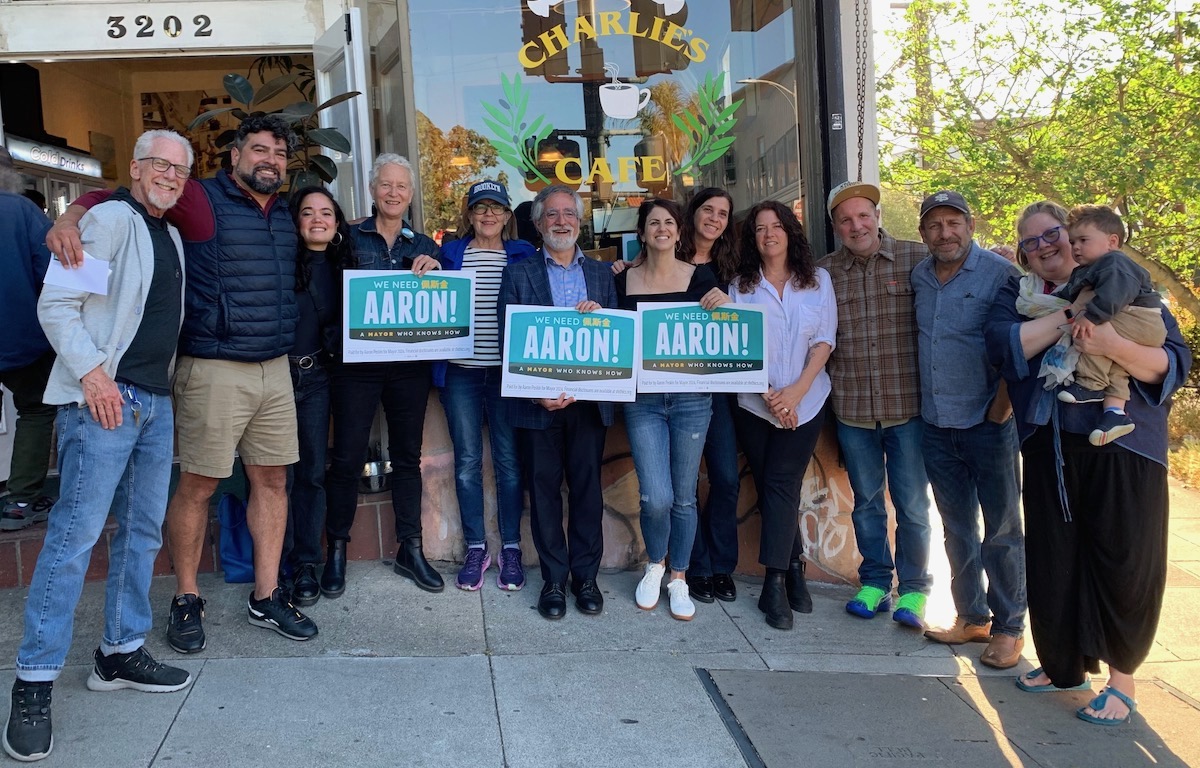Mission Local is publishing a daily campaign dispatch for each of the major contenders in the mayor’s race, alternating among candidates weekly until November. This week: Mark Farrell. Read earlier dispatches here.
When it comes to campaign finance, San Francisco mayoral candidate Mark Farrell has a record of playing fast and loose with regulations — or, as in the case with his ballot designation as a small-business owner, testing the limits of what’s allowed.
This history stretches back to 2010, when Farrell was first elected to the Board of Supervisors. His campaign was issued what was, at the time, the city’s largest-ever ethics fine in 2015 for illegally coordinating with an independent political committee. The following year, in 2016, he used leftover campaign funds to wine and dine guests at more than three dozen meals after he had already been elected.
Those questionable acts continue today: As the San Francisco Chronicle reported in late June, his campaign shared expenses with a ballot measure committee.
Such a maneuver is typical, but raised eyebrows because of the large sum involved — $57,415 — and allegations from rival campaigns he was illegally using the funds not for a ballot measure, but to subsidize his race for Room 200.
Earlier this year, his ties with the billionaire-funded political advocacy group TogetherSF drew scrutiny from Farrell’s opponents, including Mayor London Breed and Board of Supervisors President Aaron Peskin, who withdrew from a mayoral debate hosted by the group.
The totality of Farrell’s dealings, ethics experts said, are an end-run around campaign-finance law.
“It violates the law,” said Quentin Kopp, a political veteran who previously sat on the Ethics Commission. “Why do we have ordinances that establish ethics law and the Ethics Commission,” he asked, if they can be disregarded with minimal fines?
Kopp described Farrell’s record as “attempting successfully to circumvent the laws controlling the amount of contributions to his supervisorial campaign a decade ago, and now to his campaign for mayor.”
David Ho, a political consultant, added, “people are gaming the system because it is so slow to reach a conclusion, whether you’re guilty or not” As to the recent allegations, Ho said, “If it doesn’t violate the law, it violates the spirit of the law.”
Farrell’s campaign denies any foul play. “Mark has consistently followed the law at all times with fundraising, and all submitted expenses were vetted and approved by counsel,” said Jade Tu, Farrell’s campaign manager.
Mayor Breed, too, has had her issues with ethics violations, including failing to disclose contributions to her Pride float, accepting a gift — car repairs — from Mohammed Nuru (the former Public Works head who was convicted following a widespread corruption scandal), and using her position to seek clemency for her incarcerated brother. But, as of yet, none of the other candidates have matched the scale of Farrell’s violations.
Likewise, Board of Supervisors President Aaron Peskin has faced penalties. In 2019, the Ethics Commission issued Peskin a penalty of $8,000 for placing misleading advertisements in two Chinese-language newspapers during his 2015 supervisorial campaign and, in 2020, he faced a penalty of $500 for failing to report contributors who donated to his campaign in 2016.
Farrell’s violations, however, have been more consequential, in terms of the fines. A look at his history also illustrates how slowly any violations are adjudicated.
A timeline of questionable campaign acts
2010
In 2016, Farrell paid $25,000 in a settlement for alleged coordination between his 2010 supervisorial campaign and an independent political committee, Common Sense Voters; the settlement cleared Farrell of any wrongdoing. This is forbidden. Candidates for mayor and supervisor are limited to receiving $500 donations, and cannot take corporate money.
Independent-expenditure committees, however, are not limited by how much money they can receive nor from whom, but the two cannot coordinate or the $500 limit would be meaningless.
In 2010, Farrell’s supervisor opponent Janet Reilly filed a complaint stating that Chris Lee, Farrell’s campaign manager at the time, worked with Common Sense Voters to send out mailers in 2010 deterring voters from electing her.
Those mailers could have been decisive. Farrell won that race by only 258 votes.
Following Reilly’s complaint, Farrell was fined $191,000, a record at the time. The city attorney later advised that the fine should be reduced to $25,000 because the statute of limitations had run out.
In 2015, the FPPC cleared Farrell of any wrongdoing: It concluded that Farrell was not aware and did not authorize his campaign manager’s actions, although Farrell did acknowledge that he had ultimate responsibility.
Kopp called such maneuvers “cheating,” and was displeased when the Ethics Commission cut the fine. “That’s one of the reasons why I resigned from the Ethics Commission,” said Kopp.
2016
As the San Francisco Standard reported this week, Farrell used remaining funds from his 2016 race for the Democratic County Central Committee to expense more than three dozen meals for unnamed guests, after he had already been elected.
He also kept that account open, and accepted several large donations from entities that had business before City Hall around the same time in 2018, including $5,000 from Recology, the city’s trash-service provider, and $2,500 from Mayes Oyster House, a restaurant on Polk Street.
Farrell nominated Paul Giusti, a former Recology executive, for reappointment to the Treasure Island Development Authority just over a week following receipt of Recology’s payment. Giusti was one of the executives entwined in the Nuru corruption scandal: In 2021, Giusti pleaded guilty to funneling hundreds of thousands of dollars into nonprofits controlled by Nuru in exchange for hiking garbage rates for San Francisco residents.
And later, in 2018, as mayor, Farrell appointed one of the owners of Mayes Oyster House, Matt Corvi, to the Small Business Commission.
Farrell’s campaign said the commission appointments were routine, and that he did not solicit the funds personally.
2024
Ballot designation
Last month, Farrell, who is a managing director at the multi-million-dollar venture-capital firm Thayer Ventures, submitted his official ballot filings, sealing his candidacy in the November race. In these filings, he registered his occupation as a “small-business owner.”
In public, Farrell often touts his private-sector experience and often refers to himself as an “investment banker” or “venture capitalist.” He does not refer to himself as a “small-business owner.” Following Mission Local’s reporting, a group of 14 small-business owners challenged the designation, calling it “purposefully designed to mislead voters.”
Despite this complaint, the Department of Elections subsequently approved the designation after Farrell submitted a statement saying that his firm had revenue of less than $2 million, which means he will, in all likelihood, be listed as a “small-business owner” on the ballot. The department referenced the federal definition of a small business that it employs: A firm generating up to $40 million in revenue, with 100 to 1,500 employees.
Farrell’s campaign did not comment regarding the designation, and said it had “nothing to add.” The designation is the same one Farrell used in his 2010 run for office.
2024
Pooling expenses
While candidate-controlled committees cannot coordinate with independent-expenditure committees, what candidates can do is collect unlimited funds to create another committee to support a ballot initiative. Farrell’s campaign has done just that to support TogetherSF’s proposal on reforming the city’s commissions and bolstering mayoral powers.
The proposal would effectively cut the city’s 130 commissions in half, capping them at 65. While the measure only qualified earlier this week, Farrell’s committee has already raised nearly $400,000 in support of it.
This piggybacking on ballot measures is not unusual, but what is unusual is Farrell’s campaign listing $57,415 as a shared expense between both committees to pay his campaign’s staffers. In particular, campaign insiders questioned the alleged rationale behind the expense — staffers to canvass and raise support for the measure — since the measure had not qualified for the ballot at the time.
Pooling expenses in this way makes it far easier for Farrell to cover campaign costs, the political consultant Ho said. If a Farrell staffer earning $5,000 were paid by Farrell directly, he would need 10 $500 donations every month, he said, because of the contribution cap. But through a ballot measure committee? “Someone like William Oberndorf can just write a check and pay for months of my salary,” said Ho.
“How is that not violating the spirit of the law?” Ho asked.
Correction: A previous version of this story noted that London Breed failed to disclose the car repair from Mohammed Nuru. She failed to disclose the Pride float donations, but she did disclose the car repair.









Well, he’s just a small business owner with no legal training or even anyone to help out at all. You all should really be supporting small business owners, not trashing them for having worked so hard and making the occasional mistake because our city is so hostile to small business owners, especially venture capitalists like him.